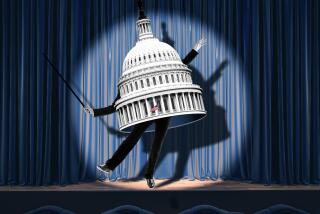Arts Funding on the Mat Again : * Endowment Showdown Nears in Congress
- Share via
In the last years of his life, William Butler Yeats offered this poetic testament to colleagues confronting a future in which their work increasingly would be judged and supported according to its political coloration:
Irish poets, learn your trade,
Sing whatever is well made.
For more than two decades, that is all the National Endowment for the Arts has asked of American artists--that they sing, write, dance, paint and perform well. That is all that should be asked; in fact, it is all that can be asked, if the NEA is to remain what its name correctly suggests it is: a modest public endowment whose funds secure for all Americans those benefits of aesthetic culture formerly reserved for the wealthy and the privileged.
The details of the conflict surrounding the NEA’s funding of a handful of works deemed objectionable by religious conservatives are, by now, too tedious to rehearse. But matters may well come to a head next week, when the future conditions of the endowment’s funding will be taken up by the Education and Labor committees of both the House and Senate.
Supporters of the public’s right to choose for itself what sort of art it will enjoy are fighting to ensure that the endowment be allowed to continue making its grants solely on the basis of artistic merit. Reasonable people are bound to differ on what constitutes merit, but sorting such questions out is one of the pleasures to be derived from real art.
Opponents of the public’s right to choose--and, in some cases, of the NEA’s very existence--want to legally restrict the content of art funded in any way by the endowment. Some of these critics simply want to ban art that they think is obscene. Others want to prohibit works they feel are blasphemous or denigrate the artifacts or beliefs of a particular religion. Reasonable people will not be left to sort out their inevitable differences over such questions. If the NEA’s critics have their way, Congress, the courts and cops will do that for them.
Until this week, the Bush Administration has understood this and, therefore, opposed the imposition of content restrictions on NEA grants. Unfortunately, the White House--increasingly mindful of its problems on the Republican right, where most of the NEA’s antagonists are found--now has abandoned its principled position.
In this, as in the flag-burning controversy, then, it falls to Congress to put courage before calculation. It would be a tragic paradox if, in the year of freedom’s triumph in so many unexpected places, the United States undertook, for the first time in its history, the formal restriction of both political and artistic speech.
Legal censorship of the arts and restriction of free expression of the sort Congress is contemplating are not slippery slopes. They are precipices, and once we step over them, there will be little but luck to break our fall.
More to Read
The biggest entertainment stories
Get our big stories about Hollywood, film, television, music, arts, culture and more right in your inbox as soon as they publish.
You may occasionally receive promotional content from the Los Angeles Times.










